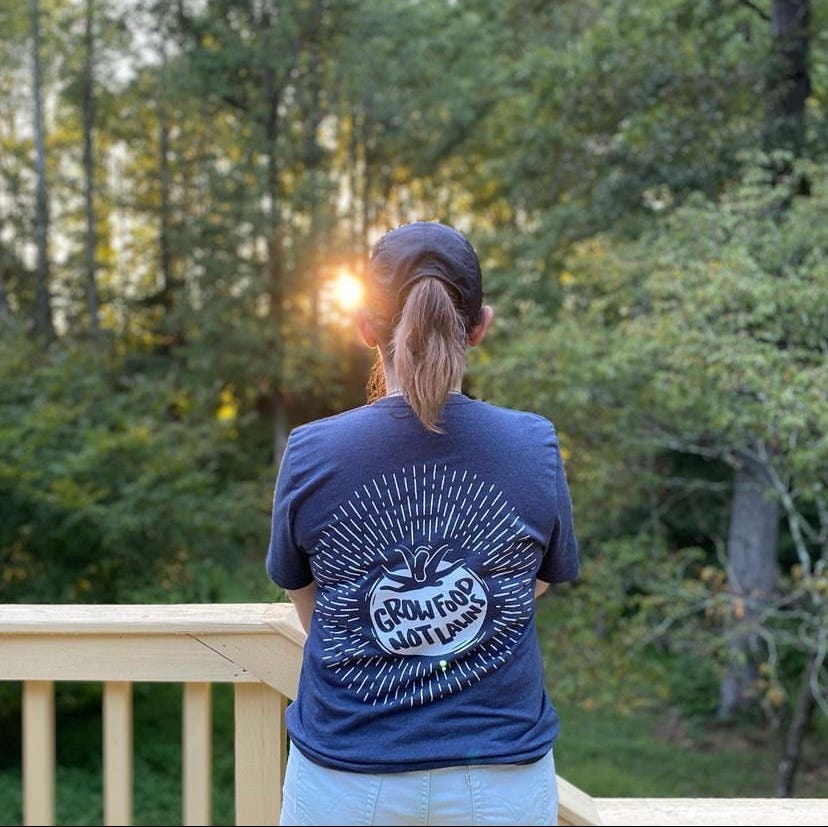Get in the permaculture headspace: Books and podcasts
We’re less than a week away from my permaculture series. Here’s what I love to read and listen to for all things permaculture.
ICYMI “Draw Your Own Permaculture Site” runs daily September 10 to 12 for all subscribers, then I’ll host a live Q&A on Zoom on Tuesday, September 19 for paid subscribers. To help you get into an ecologically-focused mindset, today I’m sharing what fuels my design inspiration.
Holding on to books is not my normal. While our home has a healthy layer of tchotchkes, I have strong minimalist tendencies. When it comes to books, I only keep the truly sentimental or ones that I will routinely use and reference. I have two two-shelf, waist-high bookshelves. Each shelf used to be packed so tight I could barely pull a book out, and I had books hidden and stacked behind the visible spines too. Now my bookends can actually fit, and one entire shelf is free of books. I share all of this because to say that I have these permaculture books means that I truly value them and find them enormously useful.
I was instantly hooked with the notion of working with nature to design productive spaces that required less work.
The little used bookstore in my town of Pittsboro, North Carolina first turned me on to permaculture. I had never heard of permaculture before. Circle City Books is a cozy shop packed floor to ceiling with books, and a tempting vinyl selection too. Along a wall of gardening books, I discovered Graham Bell’s THE PERMACULTURE GARDEN. I was instantly hooked with the notion of working with nature to design productive spaces that required less work. I pick up this book a few times each year, both for reminders and also because I always notice something that I missed.
I have a funny story about FOOD NOT LAWNS by H.C. Flores. I was so engrossed with this book that I took it with me every free moment that I had. Dog-eared pages, underlined passages, margin notes—I lived in this book. I read it while doing hawk duty with the chickens one evening, then I had to quickly get them inside when an unexpected thunderstorm rolled in. It was close to dinner time and I got sidetracked with one thing after another. The next day I noticed that I couldn’t find my book. I didn’t think to look outside. Unfortunately, my husband found it on the corner of the deck completely waterlogged from the storms, the pages twisted and bulged from the spine, and all of my margin notes reduced to watercolor impressions. He saw how sad I was and immediately ordered another one, which I’ve kept indoors ever since. Flores’ book has many illustrations and executable examples that I find inspire action and other applications.
You’ll often hear about GAIA’S GARDEN by Toby Hemenway among permaculture enthusiasts, and for good reason. GAIA’S GARDEN is a bit more technical than the other books I’ve mentioned. It explores real-life habitats and examples, lists highly detailed plant guilds, dives into the specific carbon-nitrogen composition of certain inputs for soil health, and so much more.
Oregon State University’s permaculture design certificate program requires PRACTICAL PERMACULTURE by Jessi Bloom and Dave Boehnlein. While all of my undergrad college textbooks have found other lives at thrift shops, PRACTICAL PERMACULTURE remains on my bookshelf. It’s another one that can sway technical, and sometimes that’s needed to refine a design.
When I’m not forgetting books outside in the rain, I listen to podcasts:
Earth Repair Radio – Produced by Andrew Millison, this podcast discusses large-scale permaculture applications around the world and social issues. While there are no recent episodes, there’s a good chunk of episodes when it was produced regularly.
Regenerative Agriculture Podcast – Created by John Kempf, the guests from all over the world have unique areas of expertise and deep passions for their work.
Sow Edible Farm – I was fortunate to meet one of the co-creators, Amy, at the Organic Growers School Conference a few years ago. Based in North Carolina, a little more than an hour from my home, this couple documents the journey of building their off-grid permaculture farm on about a hundred acres. Unfortunately, they stopped producing new episodes in 2020 and the rest of their digital presence has faded away. I highly recommend listening to their journey in case their podcast goes dark too.
Sustainable World Radio – Relevant and provoking, this podcast produced by Jill Cloutier explores a range of issues like the production value of chestnut trees, the environmental impact of what we wear, meadow benefits, and water management.
No-Till Growers Network – Some of my favorite episodes are interviews with the authors of WHAT YOUR FOOD ATE, and episode “Nutrition Farming” with guest Graeme Sait who shares about using refractometers and tools to identify the nutrient content of foods.
Which permaculture books and podcasts do you recommend?





